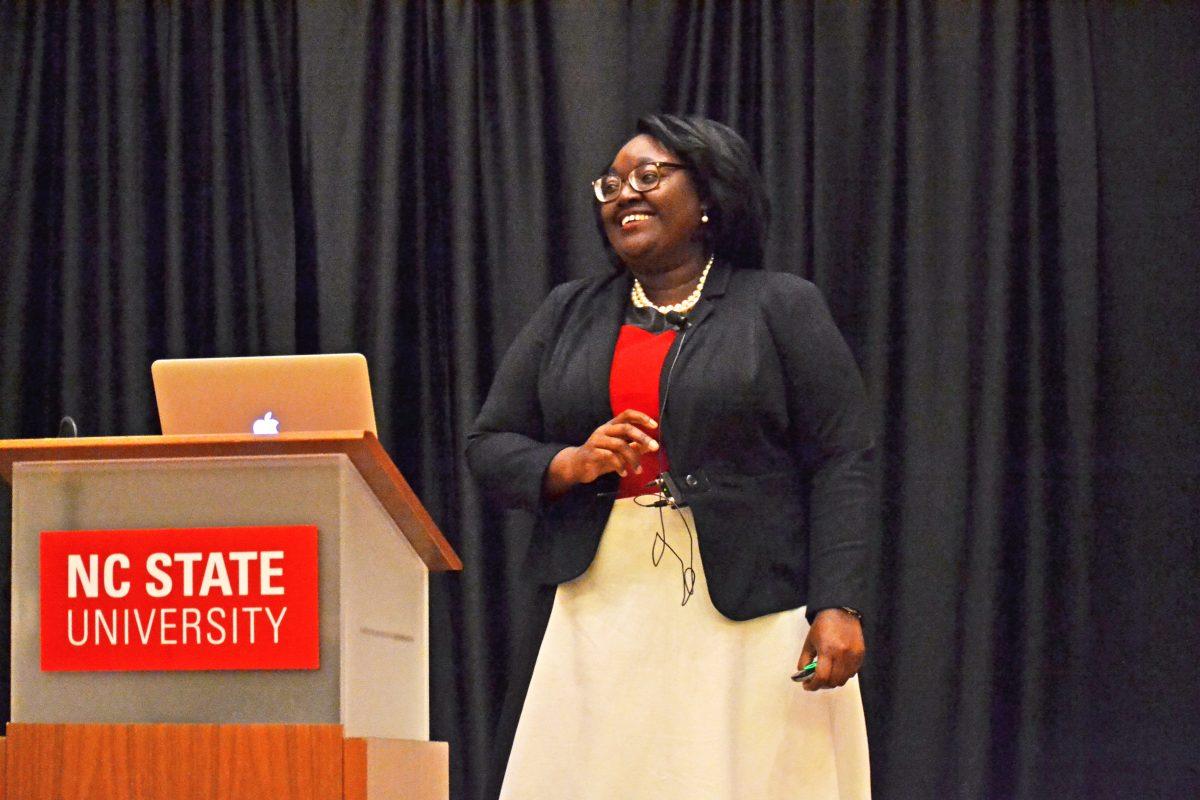 Lorraine D. Acker, director of the Margaret Sloss Women's Center at Iowa State University and keynote speaker for NC State Domestic Violence Awareness Month, talks about black women and relationship violence on Wednesday in Talley Student Union. She began her research about how black women deal with relationship violence after realizing how little research there was on the subject." />
Lorraine D. Acker, director of the Margaret Sloss Women's Center at Iowa State University and keynote speaker for NC State Domestic Violence Awareness Month, talks about black women and relationship violence on Wednesday in Talley Student Union. She began her research about how black women deal with relationship violence after realizing how little research there was on the subject." />
Sindy Huang
Lorraine D. Acker, director of the Margaret Sloss Women's Center at Iowa State University and keynote speaker for NC State Domestic Violence Awareness Month, talks about black women and relationship violence on Wednesday in Talley Student Union. She began her research about how black women deal with relationship violence after realizing how little research there was on the subject.
On Wednesday, the NC State Women’s Center hosted the Domestic Violence Awareness Month keynote speaker Lorraine D. Acker, director of the Margaret Sloss Women’s Center at Iowa State University. Acker’s address, titled “Faces in the Crowd: Black College Women and Relationship Violence,” educated attendees about relationship violence in the black female community.
Acker began the evening by introducing herself as a feminist and scholar-practitioner.
“I’m a black feminist,” Acker said. “A lot of the work informs how I show up and critically think about things. In my job as director of the Women’s Center, I’m always asking ‘Who’s missing from the table?’ It’s about inclusion, it’s about advocacy, it’s about ending oppression for all.”
Acker started the discussion by defining relationship violence, particularly as it pertains to the college environment.
“One in five women will be a victim of completed or attempted sexual assault while in college,” Acker said. “I wanted to find out where black women fall into that one in five. There’s a history behind why it is we don’t think about black women in this context. Context is important. We have all these mechanisms in place to help all women deal with trauma, so why are black women not reporting?”
Acker introduced her study of how four black women addressed relationship violence, and her desire to extrapolate how black women are contextualized in what she described as primarily monolithic, white women-centric relationship violence experiences discussed in mainstream literature.
“We’re making the assumption that because I am a black woman with these issues,” Acker said. “The only people, potentially, who can assist me may look like me. Or because I’m in crisis, the Counseling Center is my only go-to, regardless of whether or not they are culturally competent.
Acker’s three study questions included how black college women experience relationship violence, how they made meaning of their experiences, and how they navigated campus resources related to those experiences. In answering these questions, Acker interpreted her participants’ issues into poetry and sequentially analyzed their themes, including self-definition, naming, survival and meaning making.
“In thinking about why women don’t disclose, you have to think about what’s their context?” Acker said. “If a student comes in with prior victimization stemming from abuse, she will already enter the university not willing to trust anybody. Victimization can look like having a brick wall and not really engaging in the campus environment. It can look like depression. It can look like isolation.”
Acker wrapped up the address with her recommendations. These suggestions included initiating policies and practices of black college women experiences and acknowledging other forms of relationship violence.
Sara Forcella, a rape prevention education coordinator at the NC State Women’s Center, was part of the team that helped bring Acker to the event. Forcella commented on the services the center provides to domestic violence survivors here on campus.
“For survivors, we really act as a resource in referrals to other agencies within the campus and community,” Forcella said. “I see our role as being experts of the reporting process. We also provide accompaniment for students. If a student, specifically for domestic violence, needed to get a protective order through the court, then we would be able to go over with them and help them file for that. We could also go to domestic violence hearings with them.
In addition to the keynote address, the Women’s Center has hosted a variety of other Domestic Violence Awareness Month events, including a Supporting Survivors 101 workshop, a Lunch and Learn about domestic violence in the South Asian community, and a Period Poverty drive. Upcoming events for the semester include an “Escalation” film screening on Oct. 26 and a Bystander Behavior 101 workshop on Nov. 21.
Forcella said she urges NC State students to consider domestic violence on a larger scale.
“I think they should know that it is important to be aware of domestic violence, the signs of domestic violence, and the effects of domestic violence throughout the entire year, and not just the month of October,” Forcella said.
The NC State Women’s Center is located in room 5210 of Talley Student Union.